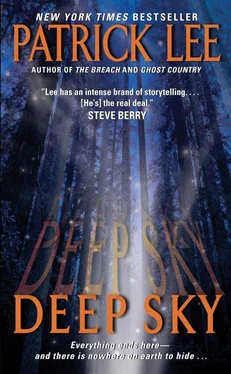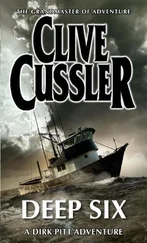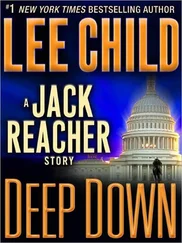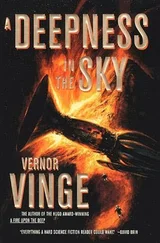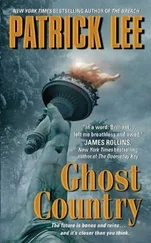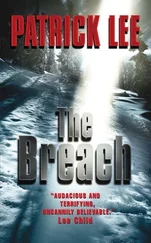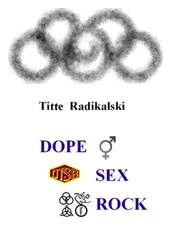Bethany double-tapped the formation near the house, and the view centered and tightened on it dramatically.
“That’s gotta be Allen Raines’s place,” she said.
She minimized the satellite frame, opened a browser and clicked on Google Maps. Within seconds she’d isolated and zoomed on Rum Lake, and then she typed an address into the search field. The hourglass flickered. A red thumbtack appeared. Same house the Humvees were parked at. Bethany was reaching to open the satellite window again when Travis grabbed her wrist, the move startling her.
“Look,” he said.
He pointed with his other hand to the center of town. In the past half second, little icons and labels had popped up along Main Street, identifying certain businesses. Both Paige and Bethany inhaled audibly when they saw the one Travis had indicated:
Its symbol was made up of a tiny fork and a knife, and its label read, THIRD NOTCH BAR & GRILLE.
They rented a Chevy Tahoe in Petaluma and were on the Coast Highway by eleven on Travis’s phone—adjusted now to Pacific time. Seven hours and forty-five minutes left to work with.
Travis drove. The ocean lay to the left, at times obscured by trees but mostly wide open and endless and blue.
“The name of a restaurant in Northern California,” Paige said, “contained in a message transmitted through the Breach.” Her eyes registered the same vague bafflement all three of them had shared since seeing the labeled icon.
In one sense Travis found it plausible: if the instructions could send Ruben Ward to a specific town, then why not a specific location within that town? But for the most part it threw him. It was, in its way, the strangest detail they’d encountered so far. The exactness of it felt absurd. Ward had been directed to travel across the continent and find a passageway beneath a place that served burgers and chicken wings and beer.
Bethany had already verified that the restaurant had been there in 1978. It dated to the late fifties and had never changed its name. As far as she’d been able to tell, the place hadn’t shown up in any headlines during the summer in question. It’d been business as usual then, and ever since.
Far north along the coast, low clouds crept inland from the sea, pressing and writhing through gaps in the mountains. The same clouds they’d seen from orbit.
“There’s something that’s bothered me since that first phone call last night,” Travis said. “The first thing we knew about the Scalar investigation: its cost. Hundreds of millions of dollars. No matter how I look at it, I can’t get it to make sense.”
“I’ve been wondering about that too,” Bethany said. “The amount is ludicrous. Even if they were accessing the hardest-to-use databases at that time—the kind where paid workers did the searching instead of computers—or running satellite surveillance every day of the week, it wouldn’t come to that cost. Not even close. Throw in the use of FBI agents to check out certain leads, compensate the Bureau for their time, you still don’t even get into the ballpark.”
“The funny thing is,” Travis said, “neither we nor Carrie ever actually knew they used any of that stuff. Satellites, federal agents, any of it. We just made those assumptions based on the huge price tag— something had to cost that much. But none of those resources make sense, when you think about it. Satellites to investigate a guy who’d been dead for three years? Database searches? Ward wasn’t leaving a paper trail—he walked out of that hospital without a single piece of ID. No credit card, no checkbook; he wasn’t even wearing his own clothes. I don’t see how you’d track him three days later, much less three years. It’d be like reconstructing the itinerary of a bum.”
“Strange,” Paige said. “With all the other questions rattling around, we never asked the most obvious one: How did the Scalar investigation work at all? How could they have pieced together any of Ward’s moves?”
“We know they really spent hundreds of millions,” Bethany said. “Whatever they spent it on, it apparently worked.”
They said no more about it, but the question stayed with Travis as he drove.
They’d figured out their approach even before landing. The single road up to Rum Lake was obviously no good, but there were others that passed within half a mile of the town, through neighboring valleys separated from it by low, forested ridges. The nearest was called Veil Road, and in the satellite frame they’d seen that it was clear of checkpoints.
They slid under the low clouds just before the turnoff, and saw at once where the road had gotten its name. A two-way blacktop, it rose in steep pitches and bends along the valley’s ascending length, climbing right into the cloudbank within the first mile. Travis saw the clouds now for what they were: a marine fog layer that nourished the flora of this place—most notably the redwoods, which flanked the road like thirty-story high-rises.
They pulled off where the map showed the ridgeline to be at its narrowest, and headed up the slope on foot.
They dropped out of the clouds twenty minutes later on the other side, and through the trees they saw the town, crisp and clear beneath its overcast lid. Well-kept storefronts with brick facades lined Main Street, probably dating back a century or more. Cottages and log cabins comprised the rest of the place, its southern half pitched upward on an incline against the foothills where the three of them now stood, its northern half ranged down to the lakefront. The town was a natural amphitheater with the lake for its stage; there couldn’t be a single building in it that lacked a million-dollar view.
The outline of streets perfectly matched Travis’s memory of the roadmap overlay. He picked out Allen Raines’s house, high on the northeast fringe of the basin, maybe a third of the way around the lake. It stood just below the fog, eye-level with their own position. The six Humvees were still there, their occupants still moving in and out of the place. No doubt they were gutting the home’s interior right to the studs, tearing out insulation batts, ripping up the carpeting and the subflooring. A single sheet of paper could hide in a lot of places. Now that he thought about it, Travis supposed it’d been stored in the most inaccessible place of all: its owner’s head. Raines had probably memorized the thing twenty-five years ago and destroyed it.
Travis lowered his eyes to the center of town and picked out the Third Notch. It had a two-story facade, green-painted wood with white trim, all of it getting on in years but well maintained. There were no Humvees parked around it. No contractors on foot, either. Through the big front windows Travis could see a few tables and booths, but all appeared to be empty. There was someone in an apron moving about, not doing a whole lot.
“Place looks a little dead,” Paige said.
“The restaurant?” Travis said.
She shook her head. “The whole town.”
Now that he looked for it, Travis saw what she meant. Rum Lake wasn’t deserted by any means, but it seemed to be at a near standstill. No kids out on bikes. No one walking dogs or just taking a stroll. A Jeep Cherokee with luggage tied to its racks pulled out of a driveway, rolled two blocks to Main and swung west. A moment later it’d crossed the outskirts and headed down the valley road toward the coast. Paige pointed out another house: its owners were hauling suitcases and bags out and stuffing them into a sedan’s trunk.
“They know something’s going on,” Travis said.
“Let’s find out what it is,” Bethany said.
They walked into the Third Notch ten minutes later. The person with the apron turned out to be a woman in her forties. Her name tag read JEANNIE. She was visibly stressed, which might’ve made sense if the place had been bustling and understaffed. But it wasn’t. It was empty except for Jeannie and two kids—a boy and a girl, maybe six and ten respectively, clearly hers. The two of them were playing handheld video games at one of the tables and looked thoroughly bored.
Читать дальше
